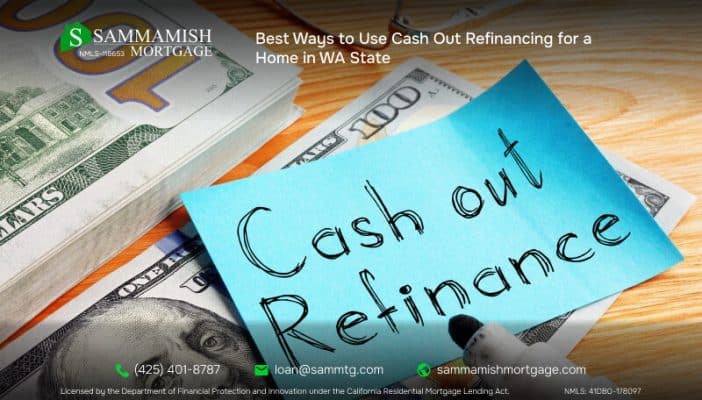No Obligation and transparency 24/7. Instantly compare live rates and costs from our network of lenders across the country. Real-time accurate rates and closing costs for a variety of loan programs custom to your specific situation.

Unlocking the equity in your Washington home can open doors to smart financial moves. Whether you’re renovating, consolidating debt, or funding education, cash-out refinancing offers flexible access to capital. Here’s how to use it wisely and make the most of your home’s value.
Cash-out refinancing involves replacing your existing mortgage with a new one that’s larger than your current loan balance. The difference between the two amounts is paid to you in cash, which you can use for virtually any purpose. Unlike a home equity loan or line of credit, cash-out refinancing consolidates your debt into a single mortgage with potentially better terms.
Washington’s real estate market has seen steady appreciation over the past decade, especially in areas like Seattle, Bellevue, Tacoma, and Spokane. This means many homeowners have built up significant equity in their homes. With interest rates still relatively low and property values high, cash-out refinancing offers a timely way to leverage that equity.
Here are some of the ideal ways to use a cash-out refinance for a Washington home:
One of the most popular uses of cash-out refinancing is funding home upgrades. Whether you’re remodeling your kitchen, adding a bathroom, or building an ADU (Accessory Dwelling Unit), investing in your property can increase its value and improve your quality of life.
Benefits:
High-interest credit card debt and personal loans can drain your finances. Cash-out refinancing allows you to consolidate these debts into a single, lower-interest mortgage payment.
Benefits:
College tuition, vocational training, or even private school fees can be overwhelming. Using home equity to fund education can be a smart alternative to student loans, especially if your mortgage rate is lower.
Benefits:
Entrepreneurs in Washington often use cash-out refinancing to fund startups or grow existing businesses. Whether you need capital for equipment, inventory, or marketing, your home’s equity can provide a low-cost funding source.
Benefits:
Life happens—medical bills, job loss, or unexpected repairs can strain your budget. Cash-out refinancing can provide a financial cushion when you need it most.
Benefits:
Washington’s rental market is strong, especially in urban centers and college towns. Cash-out refinancing can help you purchase a second property or invest in a rental unit.
Benefits:
If you have a Home Equity Line of Credit (HELOC) or a second mortgage, cash-out refinancing can consolidate these into one loan with a fixed rate and predictable payments.
Benefits:
Before jumping into a cash-out refinance, Washington homeowners should weigh the pros and cons:
Break-Even Point: Calculate how long it will take to recoup refinancing costs through savings or investment returns.
To qualify for cash-out refinancing in Washington, you’ll typically need:
Lenders may also consider your debt-to-income ratio and payment history.
The cash-out refinance is a versatile loan meeting diverse financial needs. There are, of course, other avenues that may or may not be worthwhile to pursue.
A second mortgage looks very much like the first: often a fixed rate loan amortized — or paid off in regular installments — right from the start of the loan term, 15 or 30 years e.g. However, the application is underwritten with the first mortgage in mind, i.e. loan-to-value ratio is combined with the outstanding balance on the first mortgage (CLTV).
So, if a house worth $500,000 has $100,000 left on the first mortgage, the LTV sits at 20 percent. Should the owner take a second mortgage for $50,000, the CLTV will be 30 percent. It is against that figure that the application is measured.
Rates on a second mortgage are generally higher than rates on first mortgages due to the increased risk for the lender being in second lien position. Additionally second mortgages are not backed by government agencies such as Fannie Mae, Freddie Mac, HUD, or the VA.
Interest charges for HELOCs are lower than personal, unsecured credit lines. During what is known as the draw period, borrowers can take from the line what they need for their purposes — either the full line of credit or only part of it. Only interest needs to be paid back during the draw period. When the subsequent repayment period commences, no further draws are allowed and repayment will include principal and interest. Of course, as with mortgages, the credit will come with closing costs and associated fees.
Home Equity Lines of Credit rarely have a fixed rate option which makes them risky if you are borrowing large sums of money long-term. A HELOC is a perfect tool to have in place in case of an emergency or unexpected economic opportunity, but other options such as a cash out refinance will often be a better way to go if you need to borrow the money long-term.
Clearly, the cash-out refinance has numerous pluses, especially when proceeds are used wisely. Yet experienced hands in home finance know that one should never say never. Talking with experienced loan officers who understand the ins and outs of mortgage operations — is the best way to determine the best course of action. When they can hear the goals and concerns of borrowers, these professionals can better fit them into the most advantageous loan.
Sammamish Mortgage has been since 1992 and is proud to offer our expertise to you. Based in the Pacific Northwest, Sammamish Mortgage provides mortgage loan programs in Washington, Idaho, Colorado, California, and Oregon. If you are looking for mortgage refinancing, we are here for you. Contact us at (425) 401-8787 or email us at loan@sammtg.com with any questions. Or, visit our website to get an instant rate quote.
What is cash-out refinancing?
Cash-out refinancing is when you replace your current mortgage with a new one for a higher amount and receive the difference in cash.
Is cash-out refinancing available in Washington State?
Yes. Most lenders in WA offer cash-out refinancing for primary residences, second homes, and investment properties.
How much equity do I need to qualify?
Typically, you need at least 20% equity remaining after the cash is withdrawn.
Is cash-out refinancing taxable in WA?
No. The cash you receive is considered loan proceeds, not income, so it’s not taxable.
Is cash-out refinancing good for home renovations?
Yes. It’s one of the most popular ways to fund upgrades like kitchens, bathrooms, or energy-efficient improvements.
Can I use cash-out funds for landscaping or outdoor projects?
Yes. Projects like decks, patios, and gardens are eligible uses and can boost property value.
Can I use cash-out refinancing to pay off credit card debt?
Yes. Many homeowners consolidate high-interest debt into a lower-rate mortgage payment.
Can I use it to invest in stocks or real estate?
Yes, but it carries risk. Always consult a financial advisor before using home equity for investments.
Can I use cash-out refinancing to pay for college tuition?
Yes. Many WA families use home equity to fund education expenses.
Is it a good option for medical bills or emergencies?
It can be, especially if you need a large sum and want lower interest than credit cards or personal loans.
Can I use it to start a business?
Yes. Some entrepreneurs use home equity to fund startups or expand existing businesses.
Is cash-out refinancing regulated in WA State?
Yes. Washington follows federal lending laws and state-specific consumer protection rules. Always work with licensed lenders, like Sammamish Mortgage.


Whether you’re buying a home or ready to refinance, our professionals can help.
{hours_open} - {hours_closed} Pacific
No Obligation and transparency 24/7. Instantly compare live rates and costs from our network of lenders across the country. Real-time accurate rates and closing costs for a variety of loan programs custom to your specific situation.
Adjust the parameters based on what you want to track